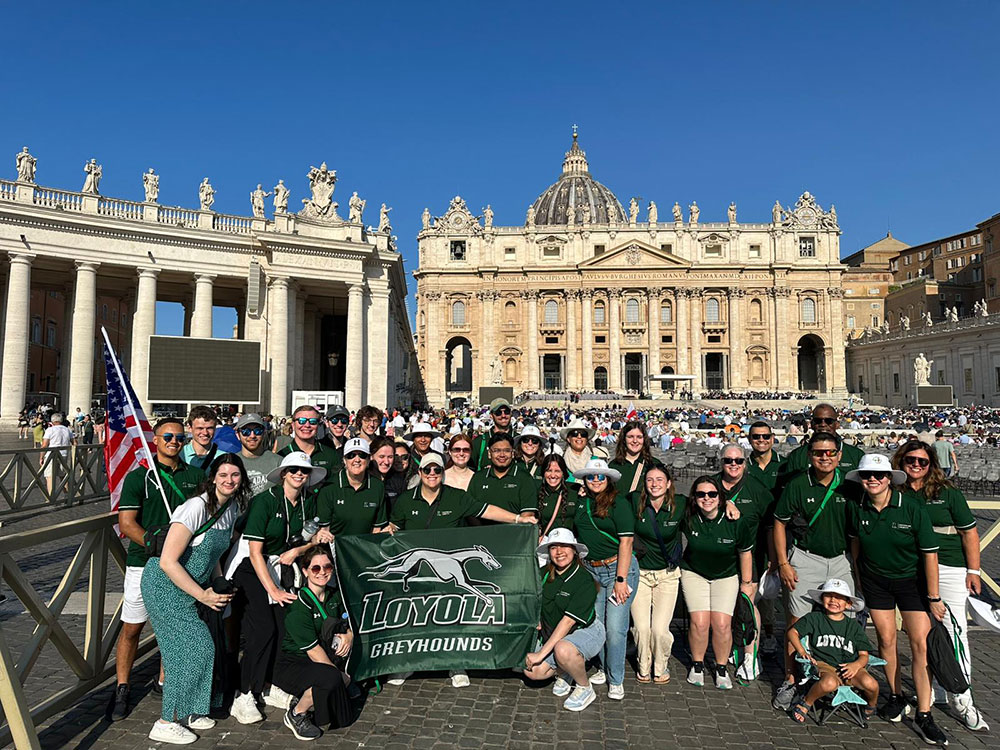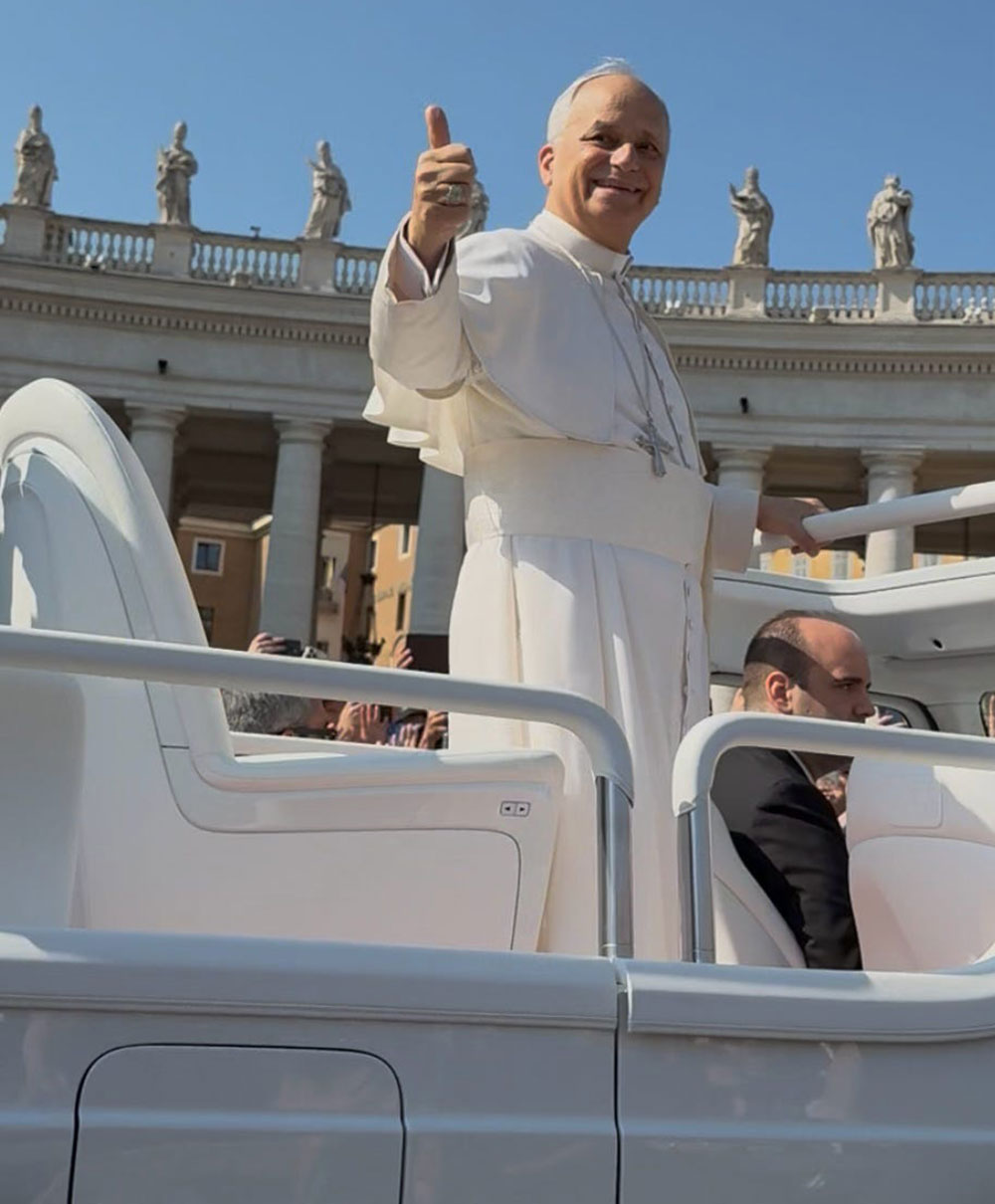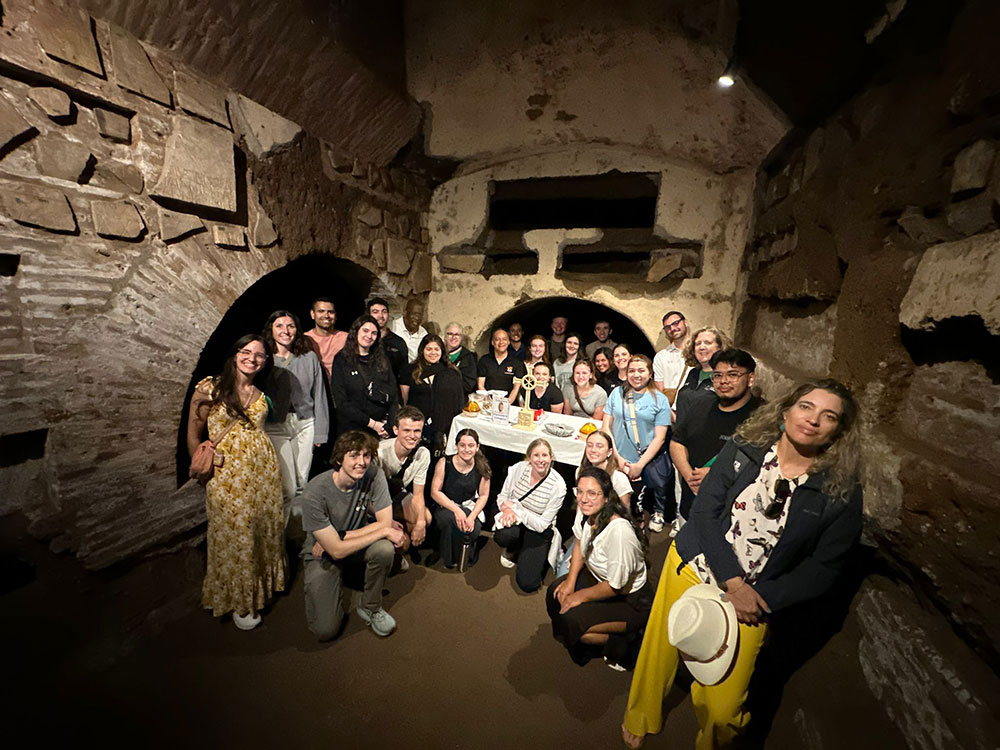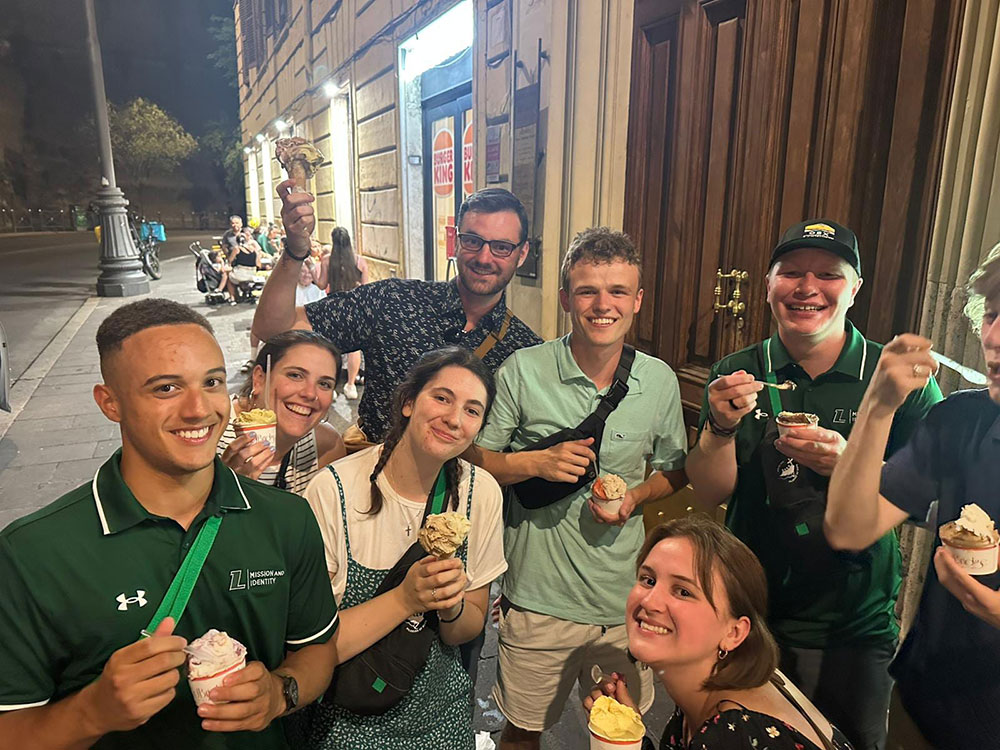Loyola pilgrims travel to Rome for 2025 Jubilee and audience with Pope Leo XIV

Early in the morning on Aug. 6, 2025, 33 Loyola University Maryland pilgrims—students, faculty, staff, and clergy—arrived at St. Peter’s Square in Vatican City. They joined Catholics from around the world who had flocked to Rome for an audience with Pope Leo XIV, the first American pope.
 “Loyola University Maryland was welcomed officially at St. Peter’s Square, and all
of our students cheered and clapped,” shared Milton Javier Bravo, Ph.D., vice president
for mission and identity. “We got very close to the Popemobile as the pope came by.
One of our students, Collin Ambush, ’28, held up an American flag, and Pope Leo saw
it and gave a thumbs-up, which was really special.”
“Loyola University Maryland was welcomed officially at St. Peter’s Square, and all
of our students cheered and clapped,” shared Milton Javier Bravo, Ph.D., vice president
for mission and identity. “We got very close to the Popemobile as the pope came by.
One of our students, Collin Ambush, ’28, held up an American flag, and Pope Leo saw
it and gave a thumbs-up, which was really special.”
Led by Loyola’s Mission and Identity division and Campus Ministry team, the pilgrimage was made during the 2025 Jubilee of Hope, a time to re-establish one’s proper relationship with God. The trip was made possible through funds created through a generous gift from the late J. Gordon Erberts, ’49.
“The Jubilee Year is a tradition that takes place in the Catholic Church every 25 years,” explained Bravo. “It's an opportunity to participate in meaningful religious practices, such as attending the Sacrament of Confession, praying for the Pope’s monthly prayer intention, and of course journeying in pilgrimage towards one of the Holy Doors that are open during the year of the Jubilee.”
The Loyola pilgrims’ journey began on Aug. 5, when they arrived in Rome and traveled to the Catacombs of St. Callixtus for a tour and a private Mass. At the Catacombs, they prayed for Loyola, the community, and the martyrs and early Christians buried there.
“I am grateful for the opportunity to feel connected to the Catholic Church—both around the world and across generations,” said Emily Kane, ’14, director of campus ministry. “Celebrating Mass in places such as the catacombs of St. Calixtus, where thousands of early Christians were secretly buried to avoid persecution, and in the actual rooms of St. Ignatius, where he lived and died, helped me feel deeply rooted in and connected to a lasting tradition that spans thousands of years.”

The pilgrims then continued to the Papal Basilica of St. Paul Outside the Walls, the first of four Holy Doors they would enter during their sacred journey, where they prayed at the tomb of St. Paul the Apostle. In the coming days, they also passed through the Holy Doors at the basilicas of St. John Lateran, St. Mary Major, and St. Peter.
“Walking through each of the Holy Doors, side by side with members of our Loyola community, was a powerful experience,” said Laura McCormack, ’14, associate director for liturgy and music. “I feel incredibly grateful to be part of a Church that offers such profound opportunities for grace and mercy, while also inviting us into communities filled with joy, laughter, and genuine companionship. That, for me, was the true takeaway from the trip.”
Over the course of the journey, the pilgrims visited many sacred sites rich with history and Catholic tradition. They toured the Sistine Chapel and the Vatican Museum. They visited historic neighborhoods like Trastevere and Rome’s Jewish Quarter, adding an interfaith dimension to the trip. They took in some of Rome’s most iconic landmarks like the Colosseum and the Pantheon. Some pilgrims even got up early one morning to climb the dome of St. Peter’s Basilica.
The pilgrimage for members of a Jesuit university—and the first college in the United States to bear the name of St. Ignatius of Loyola—would not have been complete without a visit to the apartments where St. Ignatius lived while in Rome.
“Visiting the Ignatian apartments and celebrating Mass in the same place St. Ignatius once lived and prayed were deeply profound experiences,” said Madeline Woltjen, ‘27. “Before Mass, our guide reminded us that St. Ignatius brought us all together—it is because of him that Loyola University Maryland exists, that we all could come to this school, and that we all were on the pilgrimage. I got chills at this thought, and carried this feeling of thankfulness for Loyola and its community with me through the Mass.”
The pilgrims also visited the tomb of Pope Francis, the first Jesuit pontiff and first from the Southern Hemisphere, who passed away on April 21, 2025. At the Laudato Si’ Gardens in Castel Gandolfo—the pope’s summer residence—they celebrated an intimate Mass for the Care of Creation.
In keeping with the University’s commitment to the Jesuit tradition, the ideals of liberal education, and cura personalis—the development of the whole person—the pilgrims took time to reflect on their experiences with one another through daily check-ins over breakfast, group reflections, and prayer.
“It was wonderful to see the students and how focused they were about their faith and how excited they were to reflect and pray in places with such tradition,” said the Rev. Gregory Chisholm, S.J., superior of the Baltimore Jesuit community.
After a week in Rome, the pilgrims celebrated with a going-away dinner before preparing to travel home and setting their sights on the fall semester at Loyola’s Evergreen campus in Baltimore. The pilgrimage had been a spiritual, prayerful, and moving experience for each of them. They had grown in their faith and friendship with one another, walked through centuries of Catholic history, and of course, eaten plenty of great food and gelato.
“Just as I felt on the final night in Rome, I am still stunned by how transformative and impactful the pilgrimage was,” said Woljten. “The companionship I experienced truly made the trip—from deep conversations over lunch, to laughter and excitement in St. Peter's Square, I made countless memories and lifelong friends.”

Loyola's 2025 Jubilee pilgrimage was coordinated with Daniel Kilbane Bizga and the Rev. Hugo Gomez-Sevilla, S.J., of Afar & Away Travel LLC. To see more highlights from the pilgrimage, check out the posts by @LoyolaMaryland and @LoyolaCampusMin on Instagram.
Loyola’s Mission and Identity division offers a variety of retreat and pilgrimage opportunities for students, faculty, and staff on their spiritual journeys. The University also typically sponsors two faculty each year for an annual summertime pilgrimage which visits important sites representative of the life of St. Ignatius of Loyola, founder of the Jesuits.